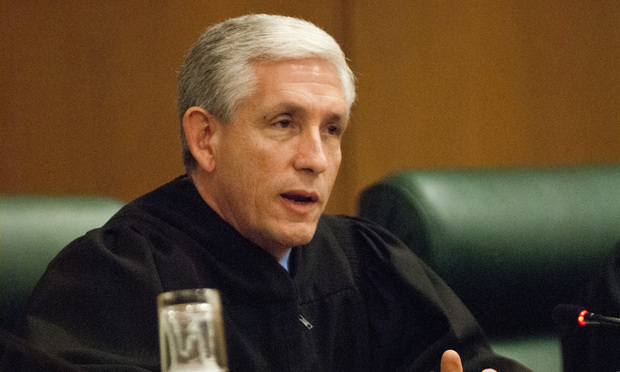Ga. High Court Seeks to End Excessive Delays in Appeals
The rare directive came Monday in an opinion on an appeal that took nearly two decades to reach the high court.
March 05, 2018 at 06:25 PM
4 minute read

Georgia's highest court is instructing judges, lawyers and others to come up with a rule to prevent unnecessary delays in the criminal appeals process after seeing many cases that languished for 10 years or longer.
The rare directive from the Georgia Supreme Court came Monday in an opinion on an appeal that took nearly two decades to reach the high court. Margie Owens was convicted in June 1998 and sentenced to serve life in prison for killing her husband. It took eight years for her motion for a new trial to be heard and denied. Then it took 11 more years for her appeal to get to the state Supreme Court.
The unanimous opinion penned by Justice David Nahmias directs the Council of Superior Court Judges of Georgia to work with groups representing prosecutors, defense attorneys, court clerks and others to come up with a proposal by Sept. 17 to address the problem of extensive and unnecessary appeal delays.
Owens' sister and adult daughter had her involuntarily committed to a hospital in April 1997 because they were concerned about her excessive drinking, violent behavior and threats to kill her husband, the opinion says. On May 17, 1997, family members came over for a cookout. Owens had been drinking heavily and argued with and threatened to kill her husband, the opinion says.
Later that night, after the guests had gone, Owens called 911 and said she may have shot her husband. Officers found Randall Owens lying face down in the trailer. Margie Owens, who was acting intoxicated and belligerent, told officers she and her husband had argued, and she shot him, the opinion says.
She testified at trial that her husband had abused her and threatened to blow her brains out the day of the shooting and that he had long been violent with her. She said he was slapping and choking her when she grabbed something to knock him off her and then heard a gunshot. She said she didn't initially know she had shot him.
A jury found her guilty of felony murder, voluntary manslaughter and a gun charge. She got life in prison for the murder conviction and five more years for the gun charge.
Within weeks of the verdict in June 1998, she filed a motion for a new trial. A hearing on that motion wasn't held until July 2006, and the court denied the motion a month later. She filed an appeal, but the case record wasn't sent to the state Supreme Court until June 2017.
In the opinion issued Monday, Nahmias wrote that, since the jury also found her guilty of voluntary manslaughter, the trial court should have tossed the murder charge. The Supreme Court voided her murder conviction and sent the case back to the trial court to enter a conviction and sentence for voluntary manslaughter.
The maximum sentence for voluntary manslaughter is 20 years in prison and there is no mandatory minimum, so even with the five-year sentence for the gun charge, the trial court could now impose a sentence that is shorter than the time Owens has already spent in prison, Nahmias noted.
Owens' attorney Jennifer Hildebrand said she is excited for her client but declined to comment further.
In addition to the “extensive and largely unexplained delays” in this case, Nahmias also listed in footnotes of the opinion dozens of other cases with unjustified delays. He noted that the Supreme Court and the Georgia Court of Appeals have repeatedly issued admonishments about such delays.
“Some delay is inherent in any legal system, particularly one as busy as Georgia's,” Nahmias wrote, “But we must all work to prevent delays, particularly in the most serious of our criminal cases, that cannot be explained or justified to the parties in those cases, the victims of the crimes, and the public we serve.”
This content has been archived. It is available through our partners, LexisNexis® and Bloomberg Law.
To view this content, please continue to their sites.
Not a Lexis Subscriber?
Subscribe Now
Not a Bloomberg Law Subscriber?
Subscribe Now
NOT FOR REPRINT
© 2025 ALM Global, LLC, All Rights Reserved. Request academic re-use from www.copyright.com. All other uses, submit a request to [email protected]. For more information visit Asset & Logo Licensing.
You Might Like
View All

Sanctions Order Over Toyota's Failure to Provide English Translations of Documents Vacated by Appeals Court
4 minute read
Second Circuit Upholds $5M Judgment Against Trump in E. Jean Carroll Case
4 minute read
'Paragraph V Displaced Lathrop': High Court Mulls Sovereign Immunity Waiver Disputes
7 minute readTrending Stories
- 1New York-Based Skadden Team Joins White & Case Group in Mexico City for Citigroup Demerger
- 2No Two Wildfires Alike: Lawyers Take Different Legal Strategies in California
- 3Poop-Themed Dog Toy OK as Parody, but Still Tarnished Jack Daniel’s Brand, Court Says
- 4Meet the New President of NY's Association of Trial Court Jurists
- 5Lawyers' Phones Are Ringing: What Should Employers Do If ICE Raids Their Business?
Who Got The Work
J. Brugh Lower of Gibbons has entered an appearance for industrial equipment supplier Devco Corporation in a pending trademark infringement lawsuit. The suit, accusing the defendant of selling knock-off Graco products, was filed Dec. 18 in New Jersey District Court by Rivkin Radler on behalf of Graco Inc. and Graco Minnesota. The case, assigned to U.S. District Judge Zahid N. Quraishi, is 3:24-cv-11294, Graco Inc. et al v. Devco Corporation.
Who Got The Work
Rebecca Maller-Stein and Kent A. Yalowitz of Arnold & Porter Kaye Scholer have entered their appearances for Hanaco Venture Capital and its executives, Lior Prosor and David Frankel, in a pending securities lawsuit. The action, filed on Dec. 24 in New York Southern District Court by Zell, Aron & Co. on behalf of Goldeneye Advisors, accuses the defendants of negligently and fraudulently managing the plaintiff's $1 million investment. The case, assigned to U.S. District Judge Vernon S. Broderick, is 1:24-cv-09918, Goldeneye Advisors, LLC v. Hanaco Venture Capital, Ltd. et al.
Who Got The Work
Attorneys from A&O Shearman has stepped in as defense counsel for Toronto-Dominion Bank and other defendants in a pending securities class action. The suit, filed Dec. 11 in New York Southern District Court by Bleichmar Fonti & Auld, accuses the defendants of concealing the bank's 'pervasive' deficiencies in regards to its compliance with the Bank Secrecy Act and the quality of its anti-money laundering controls. The case, assigned to U.S. District Judge Arun Subramanian, is 1:24-cv-09445, Gonzalez v. The Toronto-Dominion Bank et al.
Who Got The Work
Crown Castle International, a Pennsylvania company providing shared communications infrastructure, has turned to Luke D. Wolf of Gordon Rees Scully Mansukhani to fend off a pending breach-of-contract lawsuit. The court action, filed Nov. 25 in Michigan Eastern District Court by Hooper Hathaway PC on behalf of The Town Residences LLC, accuses Crown Castle of failing to transfer approximately $30,000 in utility payments from T-Mobile in breach of a roof-top lease and assignment agreement. The case, assigned to U.S. District Judge Susan K. Declercq, is 2:24-cv-13131, The Town Residences LLC v. T-Mobile US, Inc. et al.
Who Got The Work
Wilfred P. Coronato and Daniel M. Schwartz of McCarter & English have stepped in as defense counsel to Electrolux Home Products Inc. in a pending product liability lawsuit. The court action, filed Nov. 26 in New York Eastern District Court by Poulos Lopiccolo PC and Nagel Rice LLP on behalf of David Stern, alleges that the defendant's refrigerators’ drawers and shelving repeatedly break and fall apart within months after purchase. The case, assigned to U.S. District Judge Joan M. Azrack, is 2:24-cv-08204, Stern v. Electrolux Home Products, Inc.
Featured Firms
Law Offices of Gary Martin Hays & Associates, P.C.
(470) 294-1674
Law Offices of Mark E. Salomone
(857) 444-6468
Smith & Hassler
(713) 739-1250






